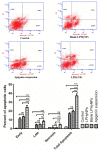Apigenin Loaded Lipoid-PLGA-TPGS Nanoparticles for Colon Cancer Therapy: Characterization, Sustained Release, Cytotoxicity, and Apoptosis Pathways
- PMID: 36080654
- PMCID: PMC9460590
- DOI: 10.3390/polym14173577
Apigenin Loaded Lipoid-PLGA-TPGS Nanoparticles for Colon Cancer Therapy: Characterization, Sustained Release, Cytotoxicity, and Apoptosis Pathways
Abstract
Colon cancer (CC) is one of major causes of mortality and affects the socio-economic status world-wide. Therefore, developing a novel and efficient delivery system is needed for CC management. Thus, in the present study, lipid polymer hybrid nanoparticles of apigenin (LPHyNPs) was prepared and characterized on various parameters such as particle size (234.80 ± 12.28 nm), PDI (0.11 ± 0.04), zeta potential (−5.15 ± 0.70 mV), EE (55.18 ± 3.61%), etc. Additionally, the DSC, XRD, and FT-IR analysis determined drug entrapment and affinity with the selected excipient, demonstrating a promising drug affinity with the lipid polymer. Morphological analysis via SEM and TEM exhibited spherical NPs with a dark color core, which indicated drug entrapment inside the core. In vitro release study showed significant (p < 0.05) sustained release of AGN from LPHyNPs than AGN suspension. Further, the therapeutic efficacy in terms of apoptosis and cell cycle arrest of developed LPHyNPs against CC was estimated by performing flow cytometry and comparing its effectiveness with blank LPHyNPs and AGN suspension, which exhibited remarkable outcomes in favor of LPHyNPs. Moreover, the mechanism behind the anticancer attribute was further explored by estimating gene expression of various signaling molecules such as Bcl-2, BAX, NF-κB, and mTOR that were involved in carcinogenic pathways, which indicated significant (p < 0.05) results for LPHyNPs. Moreover, to strengthen the anticancer potential of LPHyNPs against chemoresistance, the expression of JNK and MDR-1 genes was estimated. Outcomes showed that their expression level reduced appreciably when compared to blank LPHyNPs and AGN suspension. Hence, it can be concluded that developed LPHyNPs could be an efficient therapeutic system for managing CC.
Keywords: apigenin; apoptosis; colon cancer; hybrid nanoparticle; mTOR; sustained release.
Conflict of interest statement
The authors declare no conflict of interest.
Figures










References
-
- Slattery M.L., Mullany L.E., Sakoda L., Samowitz W.S., Wolff R.K., Stevens J.R., Herrick J.S. The NF-ΚB Signalling Pathway in Colorectal Cancer: Associations between Dysregulated Gene and MiRNA Expression. J. Cancer Res. Clin. Oncol. 2018;144:269–283. doi: 10.1007/s00432-017-2548-6. - DOI - PMC - PubMed
Grants and funding
LinkOut - more resources
Full Text Sources
Research Materials
Miscellaneous

